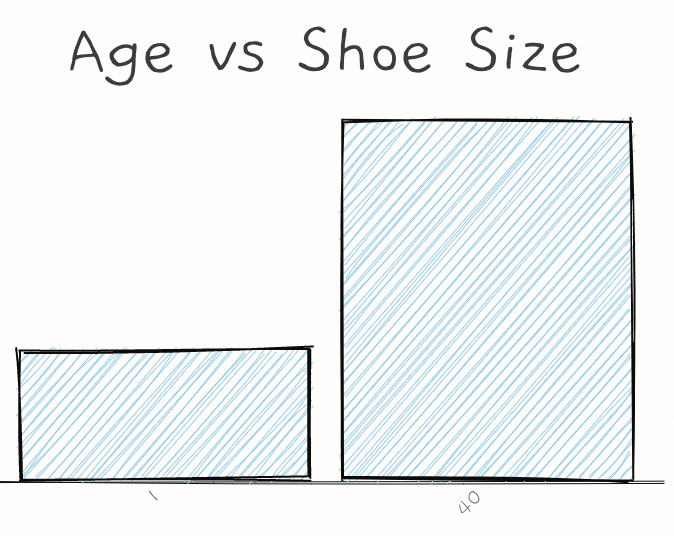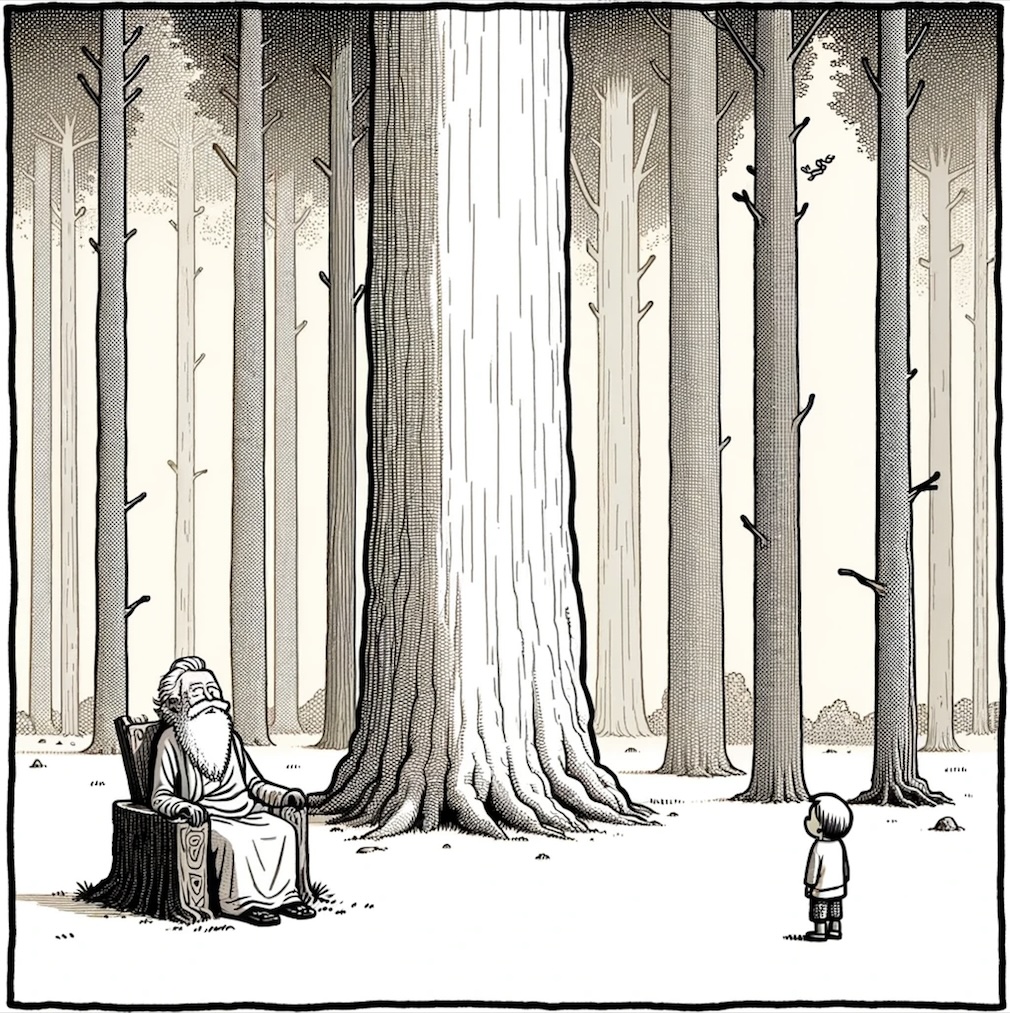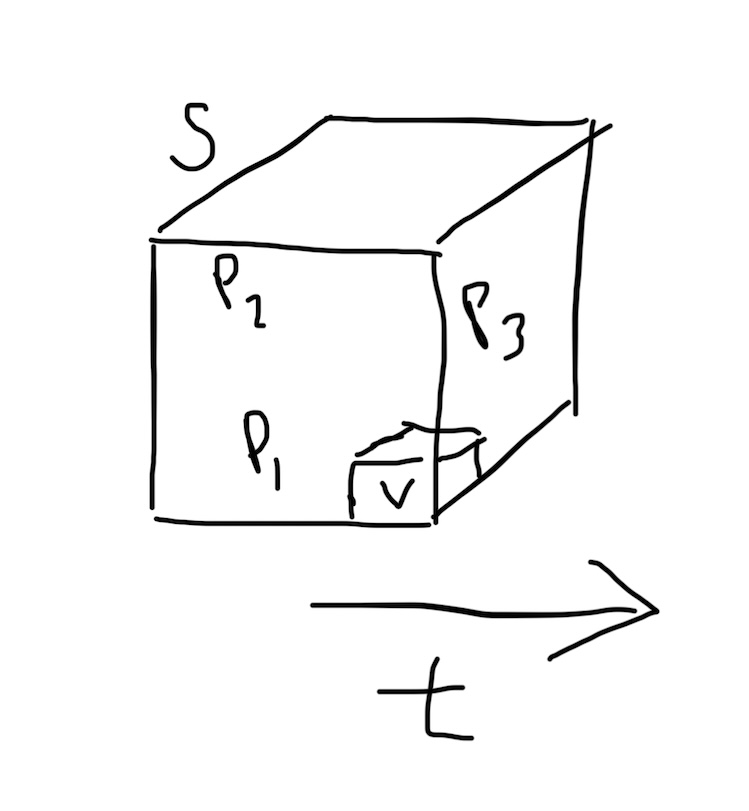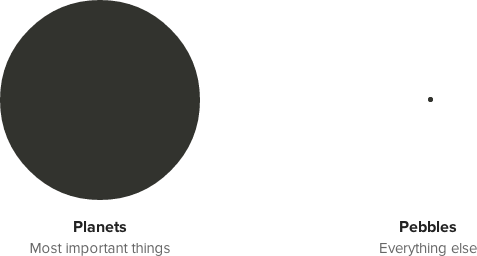"I'll give you this library," the billionaire said, sweeping his arms up toward the majestic ceiling.
"Or...you can have this scroll," he said, pointing down at a stick of paper on a table, tied with a red ribbon.
Continue reading...High Impact Thoughts

Leibniz thought of Binary Notation; Lovelace of Computers; Darwin of Evolution; Marconi of the Wireless Telegraph; Einstein of Relativity; Watson & Crick of the Double Helix; Tim Berners-Lee of the Web; Linus of Git.
Even more importantly to you and to me, at some point our mothers and fathers thought to have us.
And since we were born, many people throughout our lives have had thoughts that had high positive impact on us.
If you believe we live in a Power Law World, then it follows that there is nothing with higher expected value; nothing with more leverage; nothing with higher ROI; nothing with higher impact; than High Impact Thoughts (HITs).
HITs dominate both our professional and personal lives. Let's take a closer look.
Continue reading...
May 11, 2024 — That charts work at all is amazing.
Forty years.
One-billion heart beats.
Four-quadrillion cells.
Eight-hundred-eighty-octillion ATP molecules.
Compressed to two marks on a surface.
Continue reading...by Breck Yunits

The boy looked up at the tree that was ten times taller than the others.
Then he looked down and saw an old man sitting in a carved out stump next to the tree.
"Excuse me mister, why is that tree so tall?" the boy asked.
Gray Beard explained the tree.
"Do you understand?"
"Yes. I understand," said the boy.
The boy turned around and walked out of the forest back to the city.
Continue reading...by Breck Yunits
I was walking in the woods and saw a path on my right. I had never seen this path before.
Continue reading...Datasets are automated tests for world models
by Breck Yunits
April 23, 2024 — I wrapped my fingers around the white ceramic mug in the cold air. I felt the warmth on my hands. The caramel colored surface released snakes of steam. I brought the cup to my lips and took a slow sip of the coffee bean flavored water inside.
Happiness is a hot cup of coffee in a ceramic mug on a cold day.
Continue reading...by Breck Yunits
The girl lost the race.
"I want to be fast", she said.
"You are fast", said the man.
"No. I want to be the fastest."
Continue reading...
S = side length of box. P = pattern. t = time. V = voxel side length.
March 30, 2024 — Given a box with side S, over a certain timespan t, with minimum voxel resolution V, how many unique concepts C are needed to describe all the patterns (repeated phenomena) P that occur in the box?
Continue reading...February 21, 2024 — Everyone wants Optimal Answers to their Questions. What is an Optimal Answer? An Optimal Answer is an Answer that uses all relevant Cells in a Knowledge Base. Once you have the relevant Cells there are reductions, transformations, and visualizations to do, but the difficulty in generating Optimal Answers is dominated by the challenge of assembling data into a Knowledge Base and making relevant Cells easily findable.

Activated Cells in a Knowledge Base.
January 4, 2024 — You can easily imagine inventions that humans have never built before. How does one filter which of these inventions are practical?
Continue reading...November 16, 2022 — I dislike the term first principles thinking. It's vaguer than it needs to be. I present an alternate term: root thinking. It is shorter, more accurate, and contains a visual:
Sometimes we get something wrong near the root which limits our late stage growth. To reach new heights, we have to backtrack and build up from a different point.
A rough sketch of a semi-random selection of ideas stacked in order of importance. The biggest ideas, "upstream of everything", are at the bottom. The furthest upstream ideas we can never see. A better artist would have drawn this as an actual stream.
February 28, 2022 — There will always be truths upstream that we will never be able to see, that are far more important than anything we learn downstream. So devoting too much of your brain to rationality has diminishing returns, as at best your most scientific map of the universe will be perpetually vulnerable to irrelevance by a single missive from upstream.
Continue reading...April 26, 2021 — I invented a new word: Logeracy[1]. I define it as the ability to think in logarithms. It mirrors the word literacy.
Someone literate is fluent with reading and writing. Someone logerate is fluent with orders of magnitudes and the ubiquitous mathematical functions that dominate our universe.
Someone literate can take an idea and break it down into the correct symbols and words, someone logerate can take an idea and break it down into the correct classes and orders of magnitude.
Someone literate is fluent with terms like verb and noun and adjective. Someone logerate is fluent with terms like exponent and power law and base and factorial and black swan.
Continue reading...March 2, 2020 — A paradigm change is coming to medical records. In this post I do some back-of-the-envelope math to explore the changes ahead, both qualitative and quantitative. I also attempt to answer the question no one is asking: in the future will someone's medical record stretch to the moon?
Continue reading...March 2, 2020 — I expect the future of healthcare will be powered by consumer devices. Devices you wear. Devices you keep in your home. In the kitchen. In the bathroom. In the medicine cabinet.
Continue reading...How Old Are These Keys? Five Eras of Human Progress

My keyboard, if you removed the symbols from the typewriter and computer eras. Try it yourself.
February 25, 2020 — One of the questions I often come back to is this: how much of our collective wealth is inherited by our generation versus created by our generation?
I realized that the keys on the keyboard in front of me might make a good dataset to attack that problem. So I built a small interactive experiment to explore the history of the keys on my keyboard.
Continue reading...January 23, 2020 — People make biased claims all the time. A decent response used to be "citation needed". But we should demand more. Anytime someone makes a claim that seems biased, call them out with: Dataset needed.
Whether it's an academic paper, news article, blog post, tweet, comment or ad, linking to analyses is not enough. If someone stops at that, demand a link to a clean dataset supporting the author's position. If they can't deliver, they should retract.
Continue reading...January 20, 2020 — In this post I briefly describe eleven threads in languages and programming. Then I try to connect them together to make some predictions about the future of knowledge encoding.
This might be hard to follow unless you have experience working with types, whether that be types in programming languages, or types in databases, or types in Excel. Actually, this may be hard to follow regardless of your experience. I'm not sure I follow it. Maybe just stay for the links. Skimming is encouraged.
Continue reading...January 3, 2020 — Speling errors and errors grammar are nearly extinct in published content. Data errors, however, are prolific.
Continue reading...A Suggestion for a Simple Notation
September 24, 2013 — What if instead of talking about Big Data, we talked about 12 Data, 13 Data, 14 Data, 15 Data, et cetera? The # refers to the number of zeroes we are dealing with.
You can then easily differentiate problems. Some companies are dealing with 12 Data, some companies are dealing with 15 Data. No company is yet dealing with 19 Data. Big Data starts at 12 Data, and maybe over time you could say Big Data starts at 13 Data, et cetera.
Continue reading...March 30, 2013 — Why does it take 10,000 hours to become a master of something, and not 1,000 hours or 100,000 hours?
The answer is simple. Once you've spent 10,000 hours practicing something, no one can crush you like a bug.

The figure on top has 10,000 hours of experience and crushes people with 100 hours or 1,000 hours like a bug. But they cannot crush another person with 10,000 hours.
February 16, 2013 — Some purchasing decisions are drastically better than others. You might spend $20 on a ticket to a conference where you meet your next employer and earn 1,000x "return" on your purchase. Or you might spend $20 on a fancy meal and have a nice night out.
Continue reading...February 12, 2013 — You shouldn't plan for the future. You should plan for one of many futures.
The world goes down many paths. We only get to observe one, but they all happen.
In the movie "Back to the Future II", the main character Marty, after traveling decades into the future, buys a sports alamanac so he can go back in time and make easy money betting on games. Marty's mistake was thought he had the guide to the future. He thought there was only one version of the future. In fact, there are many versions of the future. He only had the guide to one version.
Marty was like the kid who stole the answer key to an SAT but still failed. There are many versions of the test.
There are infinite futures. Prepare for them all!
Continue reading...December 19, 2012 — For the past year I've been raving about Node.js, so I cracked a huge smile when I saw this question on Quora:
In five years, which language is likely to be most prominent, Node.js, Python, or Ruby, and why? - QuoraContinue reading...
December 18, 2012 — My whole life I've been trying to understand how the world works. How do planes fly? How do computers compute? How does the economy coordinate?
Over time I realized that these questions are all different ways of asking the same thing: how do complex systems work?
Continue reading...December 16, 2012 — When I was a kid I loved reading the Family Circus. My favorite strips were the "dotted lines" ones, which showed Billy's movements over time:

December 16, 2012 — Concise but not cryptic. e=mc² is precise and not too cryptic. Shell commands, such as chmod -R 755 some_dir are concise but very cryptic.
November 26, 2012 — For todo lists, I created a system I call planets and pebbles.

I label each task as a planet or a pebble. Planets are super important things. It could be helping a customer complete their project, meeting a new person, finishing an important new feature, closing a new sale, or helping a friend in need. I may have 20 pebbles that I fail to do, but completing one planet makes up for all that and more.
I let the pebbles build up, and I chip away at them in the off hours. But the bulk of my day I try to focus on the planets--the small number of things that can have exponential impact. I don't sweat the small stuff.
I highly recommend this system. We live in a power law world, and it's important to practice the skill of predicting what things will prove hugely important, and what things will turn out to be pebbles.
Continue reading...November 20, 2012 — "Is simplicity ever bad?" If you had asked me this a year ago, I probably would have called you a fucking moron for asking such a dumb question. "Never!", I would have shouted. Now, I think it's a fair question. Simplicity has it's limits. Simplicity is not enough, and if you pursue simplicity at all costs, that can be a bad thing. There's something more than simplicity that you need to be aware of. I'll get to that in a second, but first, I want to backtrack a bit and state clearly that I do strongly, strongly believe and strive for simplicity. Let me talk about why for a second.
Continue reading...March 5, 2011 — A good friend passed along some business advice to me a few months ago. "Look for a line," he said. Basically, if you see a line out the door at McDonald's, start Burger King. Lines are everywhere and are dead giveaways for good business ideas and good businesses.
Continue reading...August 25, 2010 — I've been working on a fun side project of categorizing things into Mediocristan or Extremistan(inspired by NNT's book The Black Swan).
I'm trying to figure out where intelligence belongs. Bill Gates is a million times richer than many people; was Einstein a million times smarter than a lot of people? It seems highly unlikely. But how much smarter was he? Was he 1,000x smarter than the average joe? 100x smarter?
I'm not sure. The brain is a complex thing and I haven't figure out how to think about intelligence yet.
Would love to hear what other people think. Shoot me an email!
Continue reading...August 25, 2010 — Doctors used to recommend leeches to cure a whole variety of illnesses. That seems laughable today. But I think our recommendations today will be laughable to people in the future.
Recommendations work terrible for everyone but decently on average.
Continue reading...August 25, 2010 — I've been very surprised to discover how unpredictable the future is. As you try to predict farther out, your error margins grow exponentially bigger until you're "predicting" nothing specific at all.
Continue reading...August 23, 2010 — Your most recent experiences effect you the most. Reading this essay will effect you the most today but a week from now the effect will have largely worn off.
Continue reading...August 23, 2010 — Note: Sometimes I'll write a post about something I don't understand at all. I am not a neuroscientist and have only the faintest understanding of the brain so this is one of those times. Reading this post could make you dumber. But occasionally writing from ignorance leads to good things--like the time I wrote about Linear Algebra and got a number of helpful emails better explaining the subject to me.
My question is: how are the brain's resources allocated for its different tasks?
Continue reading...August 11, 2010 — I've had some free time the past two weeks to work on a few random ideas I've had.
They all largely involve probability/statistics and have no practical or monetary purpose. If I was a painter and not a programmer you might call them "art projects".
Continue reading...August 6, 2010 — Three unexpected things have happened to me during my two years of entrepreneurial pursuits in California.
First, I have not gotten rich.
Second, I have met many people who have gotten rich. I've even had the pleasure to witness some of my friends get rich.
Third, I've yet to meet someone much happier than me.
I've met a large amount of people who are 6, 7, even 8 orders of magnitude richer than me and yet not a single one of them was even close to an order of magnitude happier than me.
The explanation, I finally realized, is simple.
Continue reading...August 6, 2010 — In February I celebrated my 26th Orbit. I am 26 orbits old. How many orbits are you?
I think we should use the word "orbit" instead of year. It's less abstract. The earth's 584 million mile journey around the sun is an amazing phenomena, and calling it merely "another year" doesn't do it justice.
Continue reading...June 15, 2010 — I think it's interesting to ponder the value of information over it's lifetime.
Different types of data become outdated at different rates. A street map is probably mostly relevant 10 years later, while a 10 year old weather forecast is much less valuable.
Phone numbers probably last about 5 years nowadays. Email addresses could end up lasting decades. News is often largely irrelevant after a day. For a coupon site I worked on, the average life of a coupon seemed to be about 2 weeks.
If your data has a long half life, then you have time to build it up. Wikipedia articles are still valuable years later.
What information holds value the longest? What are the "twinkies" of the data world?
Books, it seems. We don't regularly read old weather forecasts, census rolls, or newspapers, but we definitely still read great books, from Aristotle to Shakespeare to Mill.
Facts and numbers have a high churn rate, but stories and knowledge last a lot longer.
Continue reading...February 17, 2010 — If a book is worth reading, it's worth buying too.
If you're reading a book primarily to gain value from it(as opposed to reading it for pleasure) you should always buy it unless it's a bad book.
Continue reading...December 7, 2009 — Do you think in Orders of Magnitude? You should.
If you think in orders of magnitude you can quickly visualize how big a number is and how much effort it would take to reach it.
Continue reading...December 6, 2009 — Imagine you are eating dinner with 9 friends and you all agree to play Credit Card Roulette. Credit Card Roulette is a game where everyone puts their credit card in a pile and the server randomly chooses one and charges the whole meal to it.
Continue reading...December 3, 2009 — What would happen if instead of writing about subjects you understood, you wrote about subjects you didn't understand? Let's find out!
Today's topic is linear algebra. I know almost nothing about vectors, matrices, and linear algebra.
Continue reading...May 6, 2009 — There’s a discussion on a mailing list I belong to about piracy and the iPhone. One of the responders I thought was really insightful. The basic premise is “what you focus on, increases”–at least in your mind–so it’s better not to focus on negative things. In this example, by focusing on the small problem of pirated iPhone apps, bigger opportunities are missed. I’ve reprinted the part below:
Continue reading...March 31, 2009 — There’s a post currently on Hacker News that discusses irrational numbers. A long time ago irrational numbers really bothered me. I remember I had a teacher in high school who gave us extra credit for reading books about math that dealt with specific topics like pi or irrational numbers. These books gave me nightmares :). I still don’t really understand irrational numbers but haven’t thought about them in a long time. According to Wikipedia:
Continue reading...July 27, 2008 — Decided to try out one of these book social networks to see if I can find some important books I should be reading. The idea is you enter the books you’ve read and rate them, as well as the books you want to read. Then the site will show you people who like similar books and you can hopefully stumble upon some books that they’ve read that you will like.
Continue reading...